Server

Introduction
OpenCensus provides a package go.opencensus.io/plugin/ochttp which has a custom HTTP handler ochttp.Handler that can wrap your HTTP handlers while running your HTTP servers. For example
package main
import (
"log"
"net/http"
"go.opencensus.io/plugin/ochttp"
)
func main() {
originalHandler := http.HandlerFunc(func(w http.ResponseWriter, r *http.Request) {
w.Write([]byte("Hello, World!"))
})
och := &ochttp.Handler{
Handler: originalHandler, // The handler you'd have used originally
}
// Now use the instrumented handler
if err := http.ListenAndServe(":9999", och); err != nil {
log.Fatalf("Failed to run the server: %v", err)
}
}Traces
The instrumented handler creates a trace automatically for each request that is received. We shall need a Trace exporter, allowing us to examine the traces. If the request that it received contains a trace with the same context propagation format, it will continue the trace as a root, for example
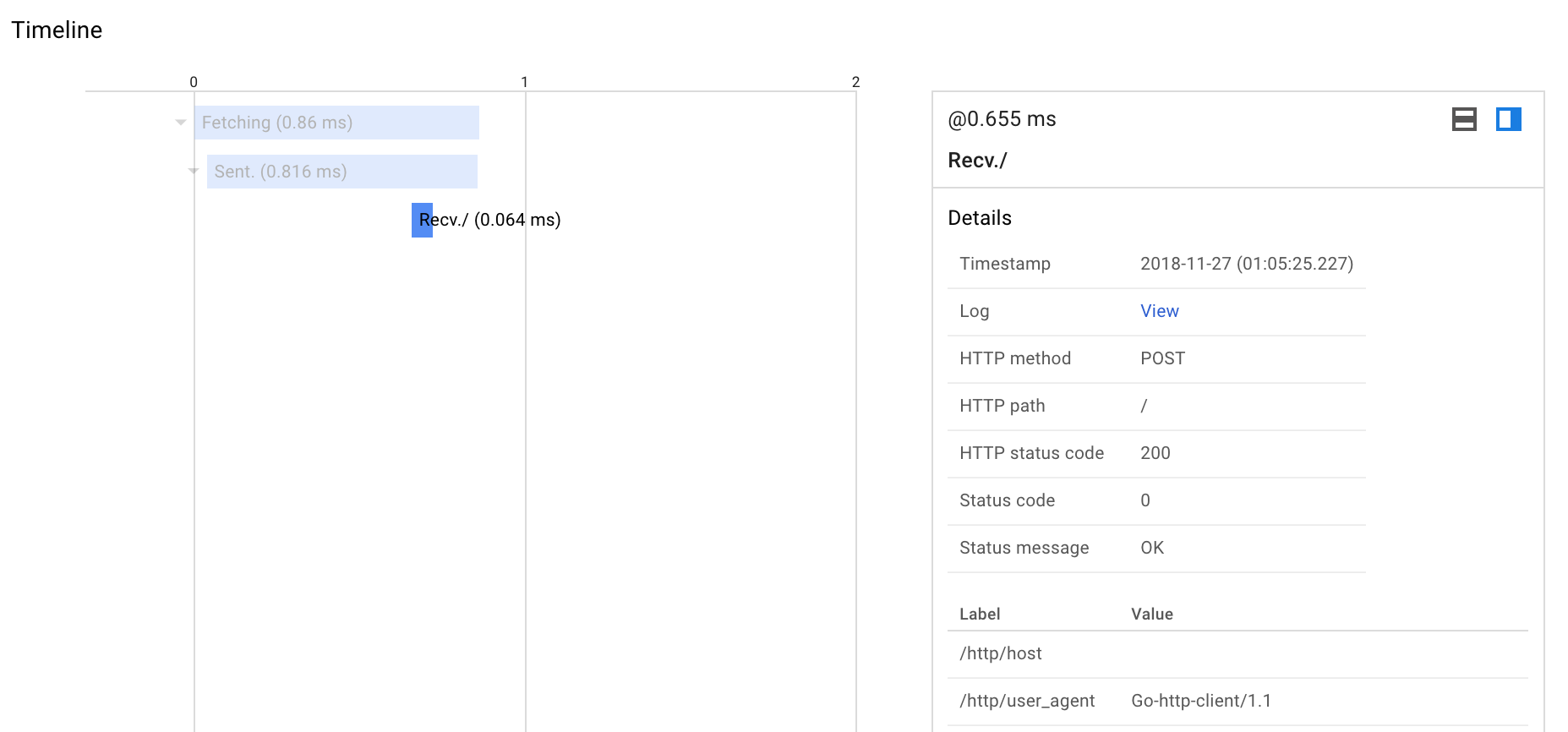
However, if the handler is started with the field IsPublicEndpoint, then the span of the propagated span will be recorded as a Parent Link instead for example
On the server side

which is the parent link of
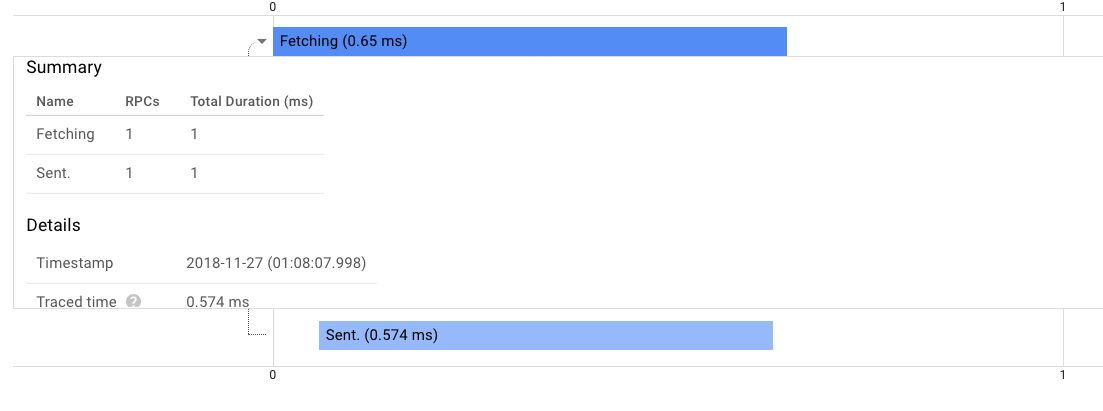
Metrics
The instrumented handler records metrics automatically for each request that is received. We shall need a Stats exporter, allowing us to examine the metrics.
Metrics can be enabled by simply registering the ochttp.DefaultServerViews
// In our main, register ochttp Server views
if err := view.Register(ochttp.DefaultServerViews...); err != nil {
log.Fatalf("Failed to register server views for HTTP metrics: %v", err)
}which then provides the following metrics
| Metric | Prefix | Description | Tags | Aggregation |
|---|---|---|---|---|
| Requests count by method | “opencensus.io/http/server/request_count_by_method” | The number of requests received | “http.method” | Count |
| Responses count by method | “opencensus.io/http/server/response_count_by_method” | The number of responses sent | “http.method” | Count |
| Size distribution of HTTP request bodies | “opencensus.io/http/server/request_bytes” | The number of bytes received per request | Distribution | |
| Size distribution of HTTP response bodies | “opencensus.io/http/server/response_bytes” | The number of bytes sent per request | Distribution | |
| Server Latency | “opencensus.io/http/server/latency” | The latency distribution of HTTP responses | Distribution |
End to end example
The following example uses the ochttp.Handler to process HTTP requests that are received every 5 seconds. It replies back with “Hello, World!” and a random payload. It exports traces and metrics to Zipkin and Prometheus are used to examine exported traces and metrics respectively. Of course you can use any other exporters of your choice
For assistance setting up any of the exporters, please refer to:
| Exporter | URL |
|---|---|
| Prometheus | Prometheus codelab |
| Zipkin | Zipkin codelab |
package main
import (
"io"
"io/ioutil"
"log"
"math/rand"
"net/http"
"net/http/httptest"
"strings"
"time"
"contrib.go.opencensus.io/exporter/prometheus"
"contrib.go.opencensus.io/exporter/zipkin"
"go.opencensus.io/plugin/ochttp"
"go.opencensus.io/stats/view"
"go.opencensus.io/trace"
openzipkin "github.com/openzipkin/zipkin-go"
zipkinHTTP "github.com/openzipkin/zipkin-go/reporter/http"
)
func main() {
// Firstly, we'll register ochttp Server views.
if err := view.Register(ochttp.DefaultServerViews...); err != nil {
log.Fatalf("Failed to register server views for HTTP metrics: %v", err)
}
// Enable observability to extract and examine stats.
enableObservabilityAndExporters()
// The handler containing your business logic to process requests.
originalHandler := http.HandlerFunc(func(w http.ResponseWriter, r *http.Request) {
// Consume the request's body entirely.
io.Copy(ioutil.Discard, r.Body)
// Generate some payload of random length.
res := strings.Repeat("a", rand.Intn(99971)+1)
// Sleep for a random time to simulate a real server's operation.
time.Sleep(time.Duration(rand.Intn(977)+1) * time.Millisecond)
// Finally write the body to the response.
w.Write([]byte("Hello, World! " + res))
})
och := &ochttp.Handler{
Handler: originalHandler, // The handler you'd have used originally
}
cst := httptest.NewServer(och)
defer cst.Close()
client := &http.Client{}
for {
body := strings.NewReader(strings.Repeat("a", rand.Intn(777)+1))
req, _ := http.NewRequest("POST", cst.URL, body)
res, _ := client.Do(req)
io.Copy(ioutil.Discard, res.Body)
res.Body.Close()
time.Sleep(979 * time.Millisecond)
}
}
func enableObservabilityAndExporters() {
// Stats exporter: Prometheus
pe, err := prometheus.NewExporter(prometheus.Options{
Namespace: "ochttp_tutorial",
})
if err != nil {
log.Fatalf("Failed to create the Prometheus stats exporter: %v", err)
}
view.RegisterExporter(pe)
go func() {
mux := http.NewServeMux()
mux.Handle("/metrics", pe)
log.Fatal(http.ListenAndServe(":8888", mux))
}()
// Trace exporter: Zipkin
localEndpoint, err := openzipkin.NewEndpoint("ochttp_tutorial", "localhost:5454")
if err != nil {
log.Fatalf("Failed to create the local zipkinEndpoint: %v", err)
}
reporter := zipkinHTTP.NewReporter("http://localhost:9411/api/v2/spans")
ze := zipkin.NewExporter(reporter, localEndpoint)
trace.RegisterExporter(ze)
trace.ApplyConfig(trace.Config{DefaultSampler: trace.AlwaysSample()})
}and to run the example
go run main.goand then start Prometheus with this configuration file prometheus.yaml
scrape_configs:
- job_name: 'ochttp_tutorial'
scrape_interval: 10s
static_configs:
- targets: ['localhost:8888']by running this command
prometheus --config.file=prometheus.yamlViewing traces
All traces
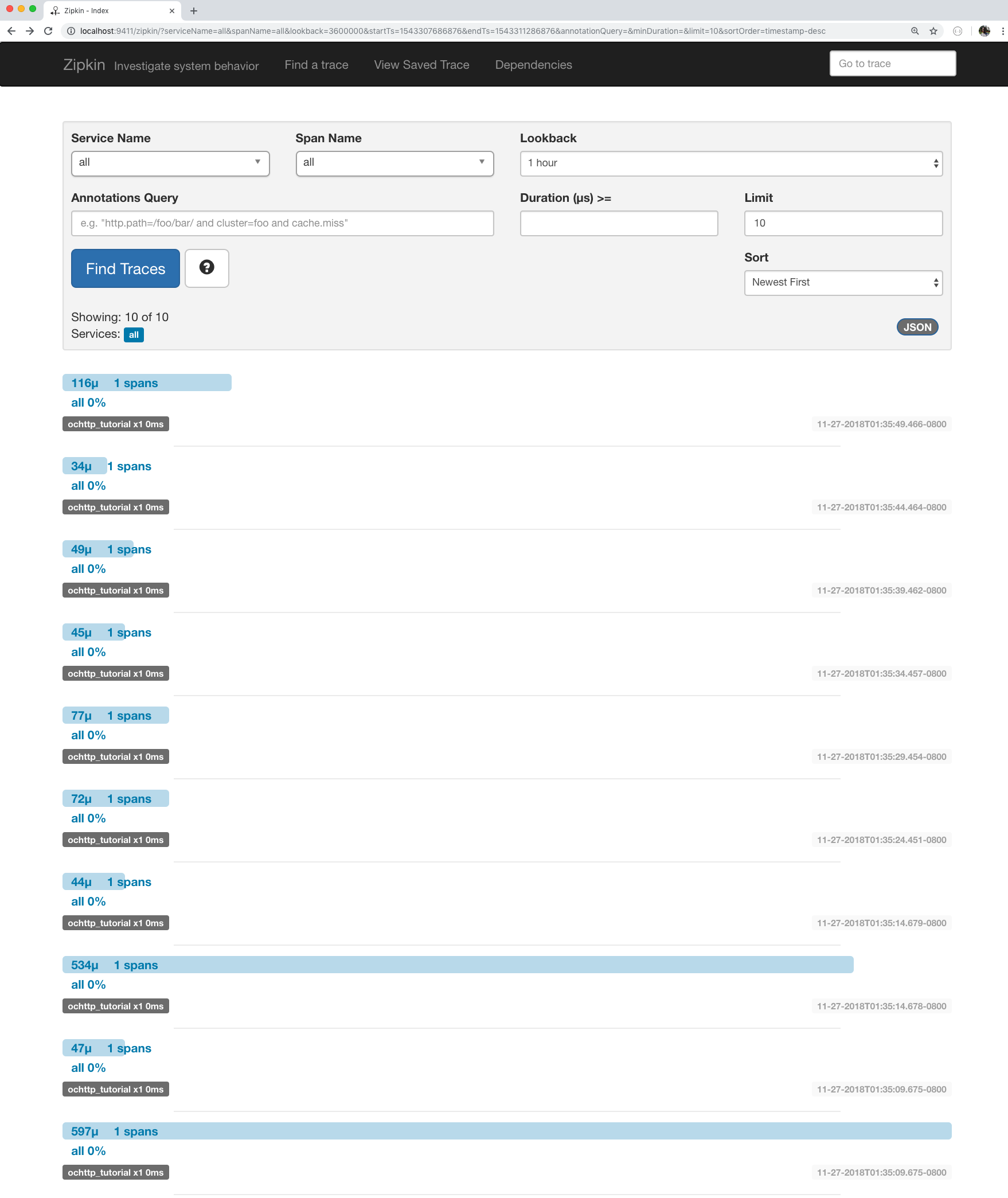
Single trace

Single trace detail
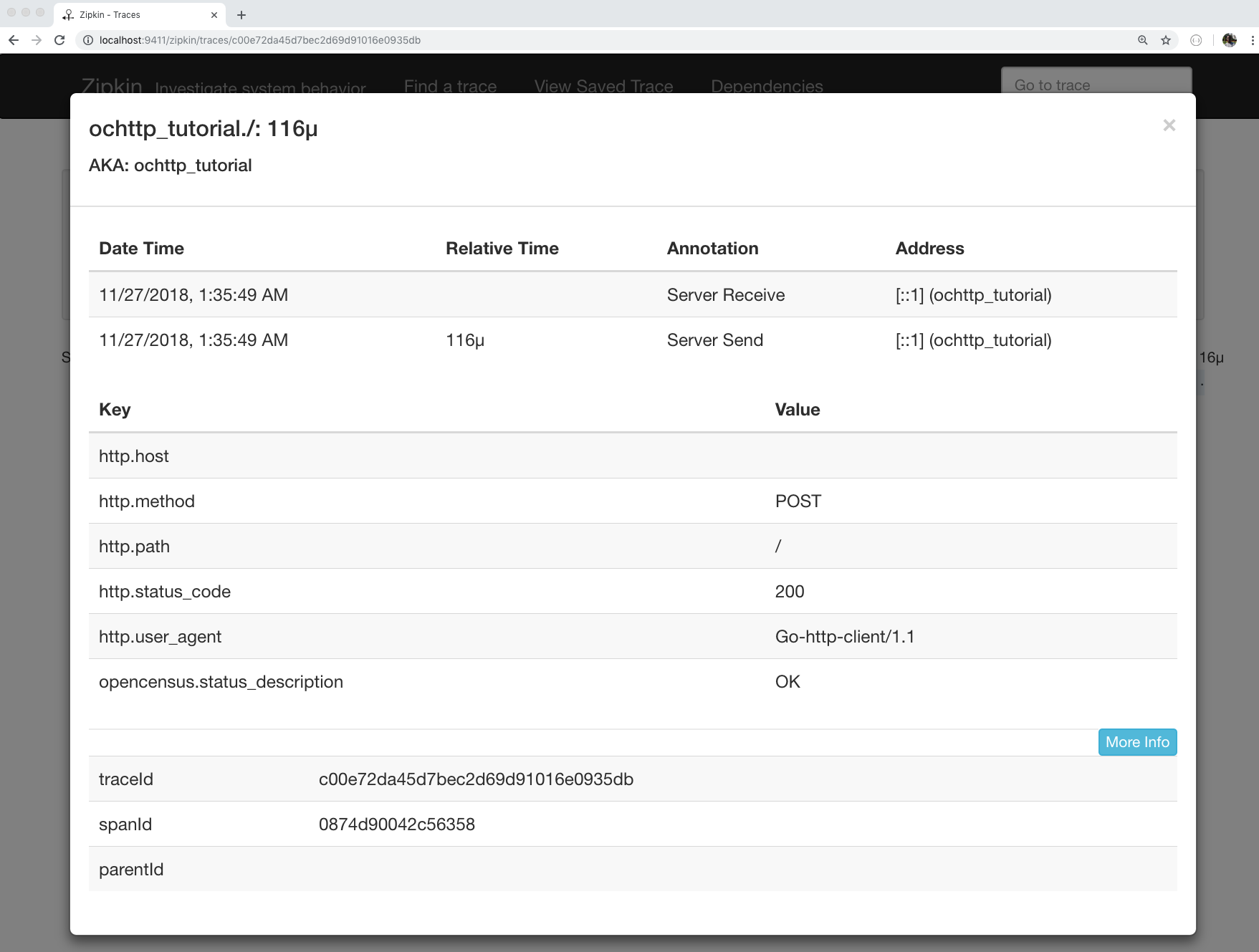
Viewing metrics
All metrics
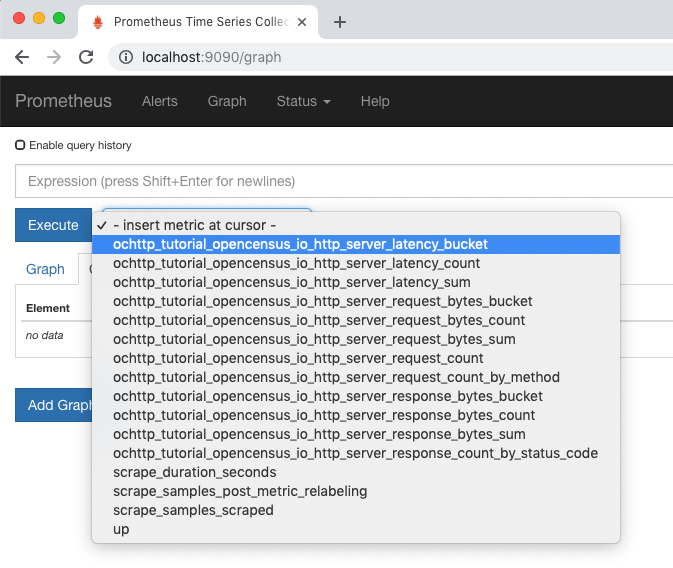
Server latency(response latency) p95th latency with Prometheus query
histogram_quantile(0.95,
sum(rate(ochttp_tutorial_opencensus_io_http_server_latency_bucket[5m])) by (job, le))
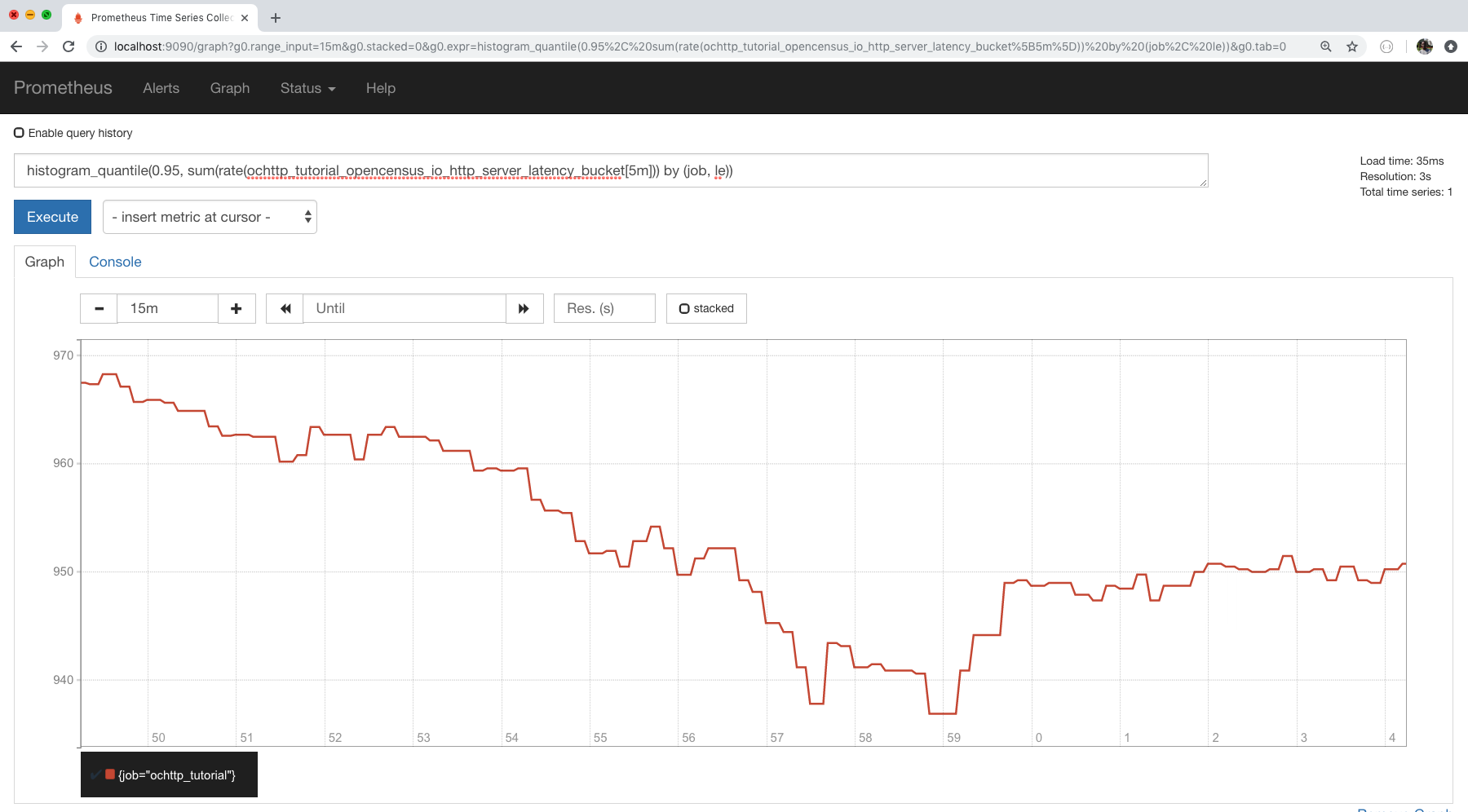
Response bytes rate
rate(ochttp_tutorial_opencensus_io_http_server_response_bytes_bucket[10m])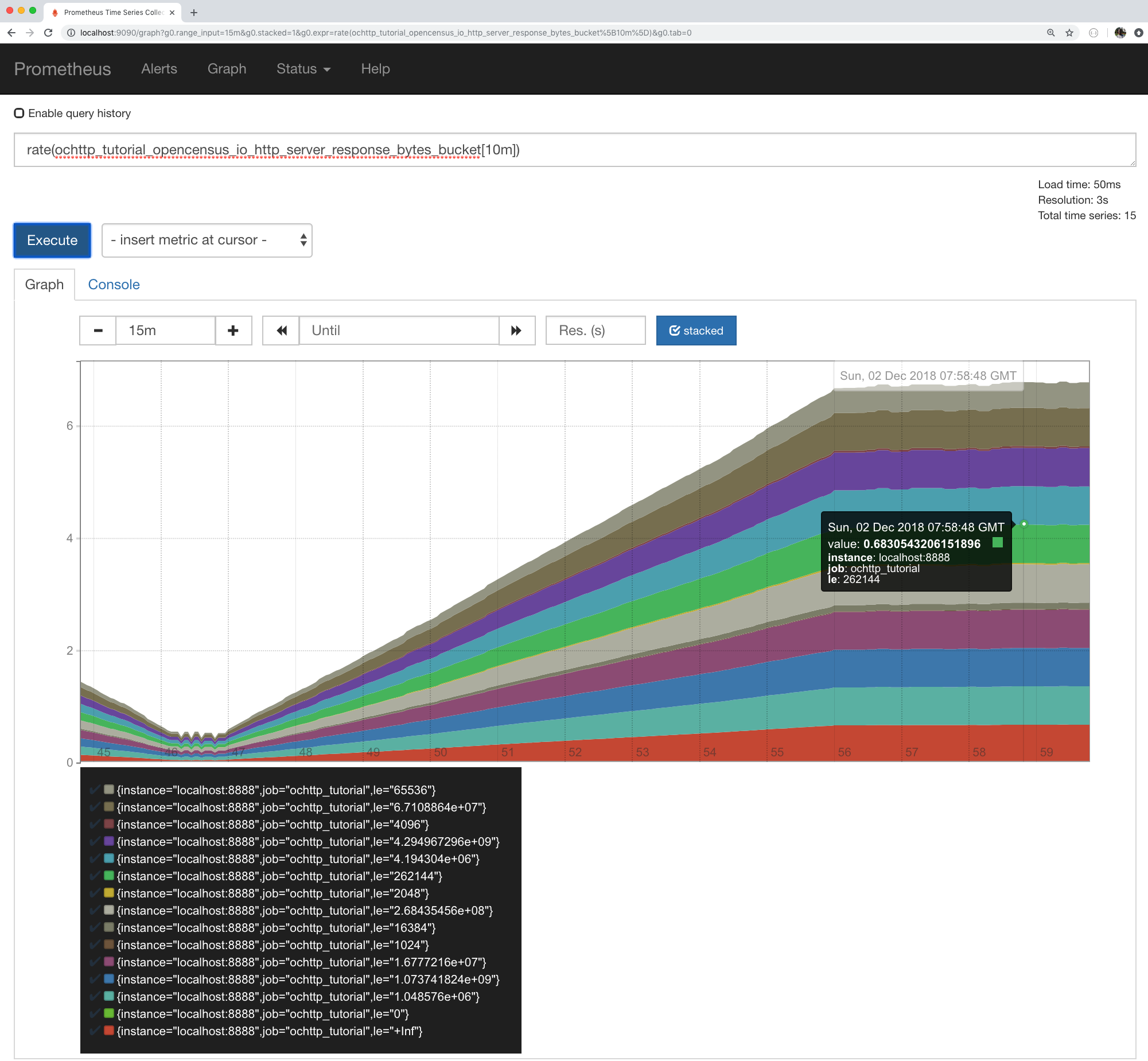
Request bytes buckets
rate(ochttp_tutorial_opencensus_io_http_server_request_bytes_bucket[10m])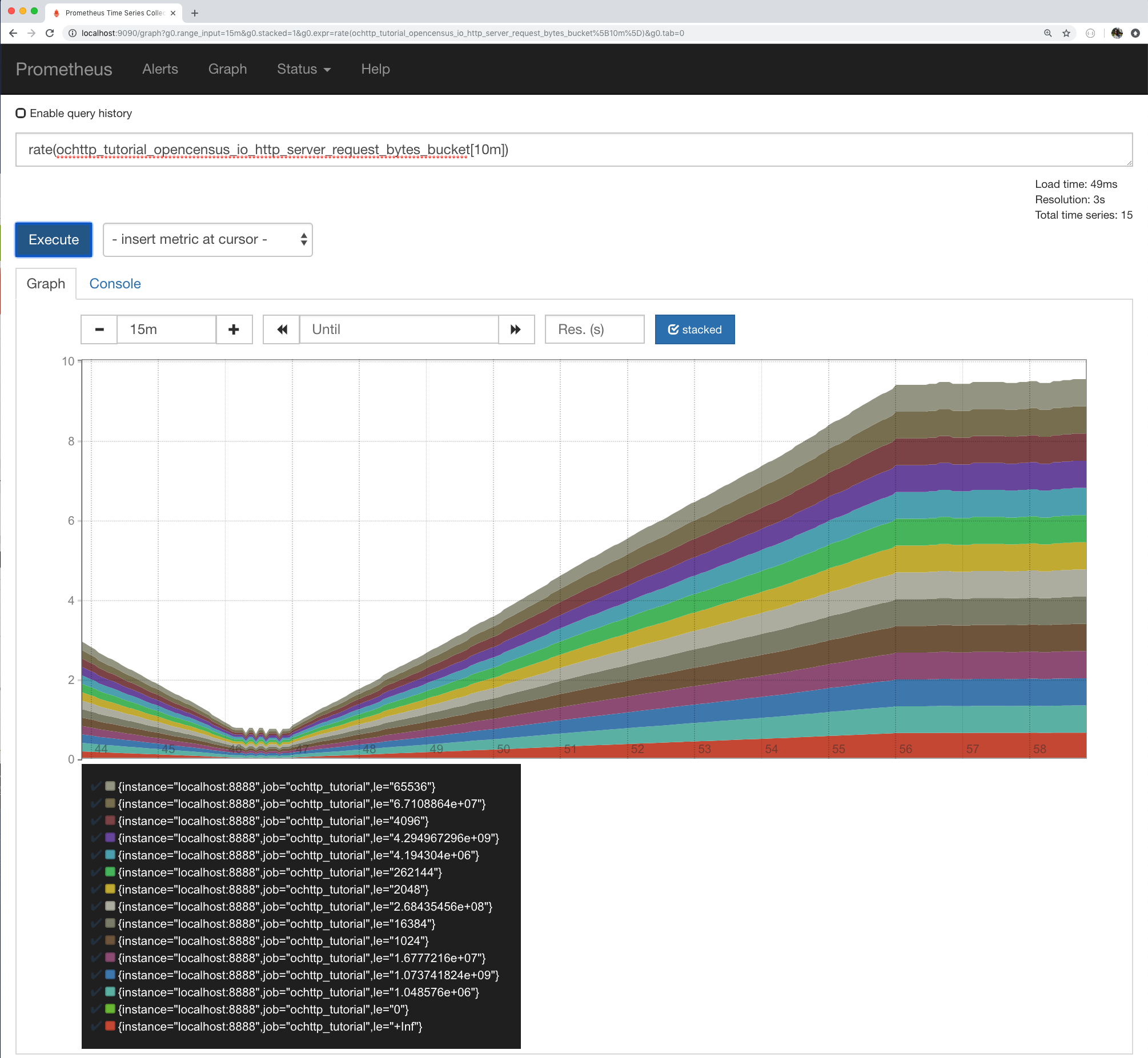
References
| Resource | URL |
|---|---|
| ochttp.Handler GoDoc | https://godoc.org/go.opencensus.io/plugin/ochttp#Handler |
| ochttp.DefaultServerViews | https://godoc.org/go.opencensus.io/plugin/ochttp#DefaultServerViews |
| net/http Godoc | https://golang.org/pkg/net/http |
| Server views in specs | HTTP.DefaultServerViews |
| Prometheus Query functions | https://prometheus.io/docs/prometheus/latest/querying/functions/ |
